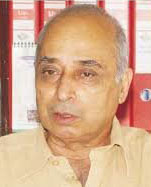
Ijaz Ahmed is a Pakistani cricket coach and former cricketer who played 60 Test matches and 250 One Day Internationals for Pakistan from 1986 to 2001. He was a part of the Pakistani squad which won the 1992 Cricket World Cup.
Anwar Hussain Khokhar was a Pakistani cricketer who was a member of Pakistan's first Test team in 1952.
Khizer Hayat is a Pakistani former cricketer and umpire. He played first-class cricket for ten years before taking up umpiring. He officiated in 34 Test matches and 55 One Day International matches.
Duncan Albert Sharpe is a Pakistani former cricketer who played in three Test matches in 1959–60. Sharpe is of Anglo-Indian heritage,and was the third Christian to play Test cricket for Pakistan. He has lived in Australia since 1961.
Afaq Hussain was a Pakistani cricketer who played in two Test matches from 1961 to 1964.
This article describes the history of cricket in Pakistan from 1947 to 1970.
Khairpur cricket team,from the town of Khairpur,Pakistan,in the district of Khairpur in the north of Sindh province,played in the Pakistan domestic first-class cricket competitions between 1958–59 and 1973–74. The team no longer plays first-class cricket.
Faqir Syed Aizazuddin,also known as Aizaz Faqir,Fakir Aizazuddin and S. A. V. Fakir,was a Pakistani cricketer.
Pakistan Eaglets were a team of young cricketers from Pakistan,founded by Justice A.R. Cornelius. They toured England and Wales every year from 1952 to 1959,Malaya and Ceylon in 1960–61,and England again in 1963. Most of their matches were non-first-class,but they played 11 first-class matches between 1960 and 1963. Many Pakistan Eaglets players went on to play Test cricket for Pakistan.
Syed Fasihuddin is a former Pakistani cricketer who played first-class cricket for several teams in Pakistan between 1957–58 and 1974–75. He toured England in 1967 but did not play Test cricket.
Combined Services (Pakistan) cricket team were a first-class cricket team for members of the Pakistan Armed Forces. They competed in Pakistan's first-class tournaments between 1953–54 and 1978–79.

Zafar Altaf was a Pakistani cricketer,cricket administrator,economist,and author who served as the chairman of the Pakistan Cricket Board in 1999.
Pakistan Universities were a first-class cricket side in Pakistan. They played first-class matches between 1950 and 1989,and took part in Pakistan's domestic competitions between 1958–59 and 1962–63,and again between 1972–73 and 1978–79.
The Income Tax Department cricket team played first-class cricket in Pakistan from 1975 to 1979,competing in the Patron's Trophy.
Syed Nayyar Hussain is a former Pakistani cricketer who played first-class cricket between 1955 and 1978.
Khalid Qureshi was a Pakistani cricketer who played first-class cricket from 1949 to 1966. He toured India in 1952–53 with the Pakistan team but did not play Test cricket.
Ikram Elahi is a former Pakistani cricketer who played first-class cricket from 1953 to 1970. He toured England in 1954 and the West Indies in 1957–58 with the Pakistan team but did not play Test cricket.
Munawwar Hussain was a Pakistani cricketer who played first-class cricket from 1961 to 1975.
Ijaz Khan known as Jahaz Khan was a first-class Pakistani cricketer who played for Lahore and Pakistan Railways between 1961/62 and 1973/74. Khan was described as ‘the finest off-break bowler,I faced in my entire career’by his cousin Majid Khan,who was the leading Pakistan batsman of his era. Ijaz Khan could not convince the BCCP selectors in the 1960s,for national recognition. Instead it was his rivals,Haseeb Ahsan,Afaq Hussain,Salahuddin and his Railways colleague,Mohammad Nazir Jr who got the nod. He was employed with the Pakistan Railways from 1958 to 1980.

Nawab Ashiq Hussain Qureshi was a popular Pakistani cricket administrator,former Captain in the Pakistan Army,first-class cricketer,former First Secretary in the Foreign Service of Pakistan,philanthropist,and Pir. He left the foreign service to set out on his journey of philanthropy returning to Pakistan. He set up a factory of Pepsi Cola and formed The Pepsi Cola Lahore Club cricket team,which emerged victorious in 14 out of 18 national club cricket tournaments spanning the 1980s to the 1990s. In 1983,he joined the Lahore based P&T Gymkhana later becoming its chairman. Under him,the club produced four international umpires including Aleem Dar and first-class cricketer Abdul Razzaq. Ashiq encouraged the youth and veterans to play sports and was known for being a close friend of Imran Khan. Additionally for his contributions and efforts to help Imran Khan with forming the Pakistan Tehreek-e-Insaf,Imran Khan Foundation,Namal Institute,and being the first to support Imran Khan on building Shaukat Khanum Memorial Cancer Hospital and Research Centre,serving as a member of the hospitals Board of Governors since its inception until his death,and establishing Pakistan Veterans Cricket Association across Pakistan becoming its Vice President and later Chief Executive Officer. Ashiq is further known for being the first to hug Imran Khan after Pakistan won the 1992 Cricket World Cup. Ashiqs nephew writes that Ashiqs home was littered with trophies from across the country to the extent that his aunt Farzana used some as flower pots.


